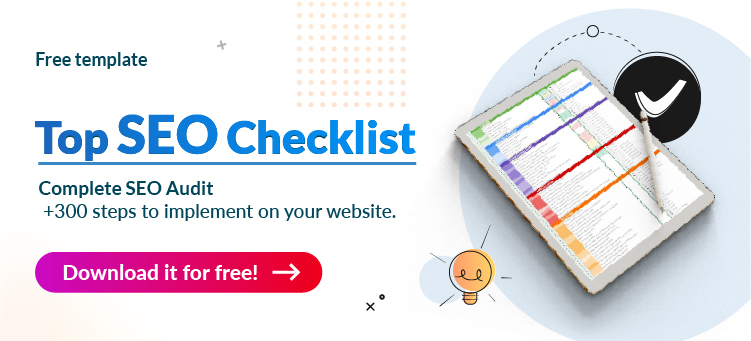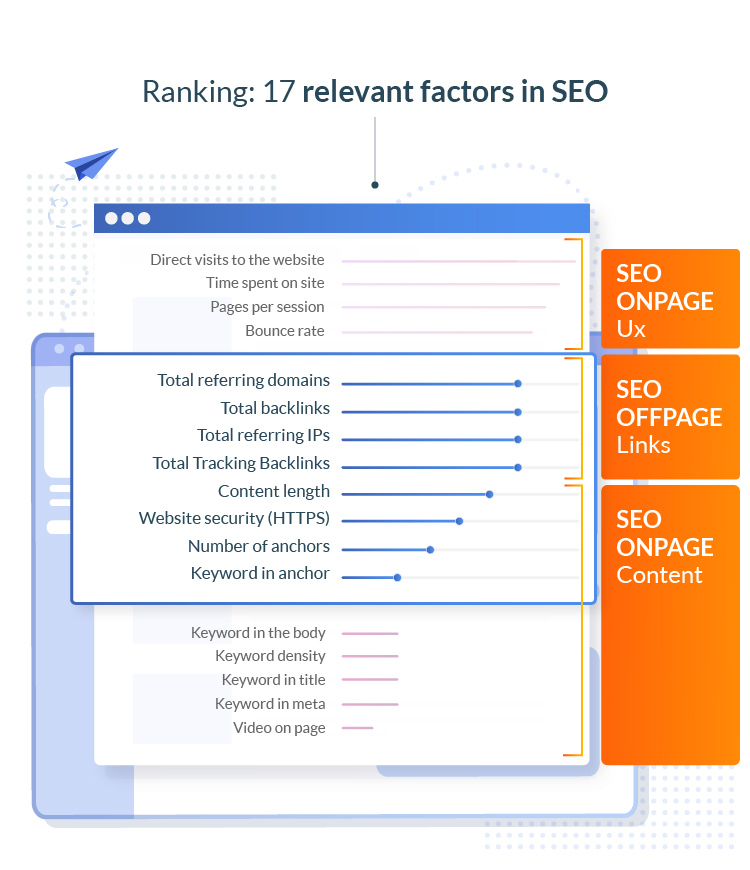
When we talk about SEO ranking, we must keep in mind that it is a constantly changing discipline, which obliges us to stay up-to-date with the latest developments in the industry. If you want to get traffic to your website, you have no choice but to stay informed or you will be doomed to failure.
A properly optimized website will gain more and more traffic over time, which translates into new potential customers as well as more sales. What is clear is that without an SEO strategy, search engines won’t be able to find you, making all your previous work in vain.
Therefore, in this guide, we will share those factors that, in one way or another, are essential when performing the SEO ranking of a website.
To begin with, we have created the following table of contents for those who wish to make a specific inquiry about any of the factors we will see, or for those who wish to access exclusively the SEO ranking factors that are most interesting to them:
What are the most important SEO ranking factors?
Let’s take a look at these factors:
– Accessibility and security of the website.
– Loading speed of the website on different devices.
– Mobile device compatibility.
– Age of the domain, URL, and website authority.
– Optimized content for search engines.
– Technical SEO.
– User experience (RankBrain).
– Links.
– Social signals.
– Real commercial information.
As you can see, there are many factors to consider, and these are just the most important ones.
Therefore, before diving into these factors, let’s quickly review the basics about search engines to ensure we don’t miss anything.
How does a search engine work?
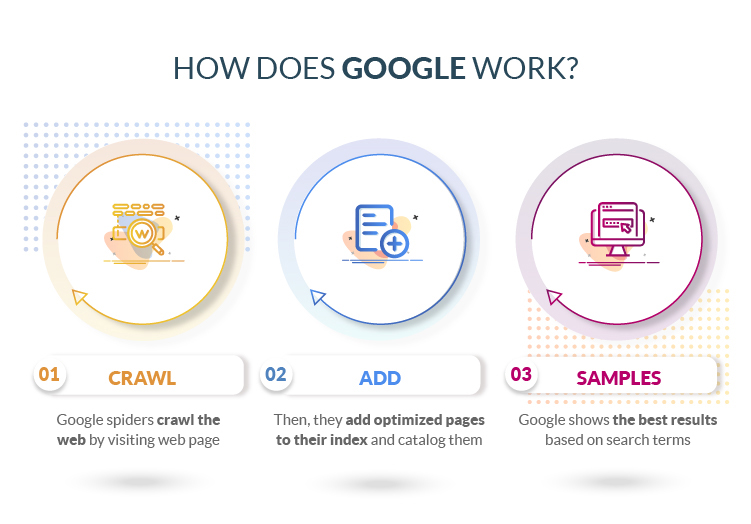
The functioning of search engines is based on the crawling of hundreds of thousands of web pages through their own crawlers or search spiders. Every search engine navigates the web by analyzing web pages and following their outgoing links to discover new pages on the same topic.
[RoadMap]For more information: How do search engines work?
What is SEO and what is it used for?
SEO stands for Search Engine Optimization, which encompasses any action directed towards search engine positioning or optimization. It is the process of improving both the visibility and quality of traffic to a website in the organic results of different search engines.
[RoadMap]For more information: What is SEO and why do you need it?
What is search intent in SEO?
Search intent refers to the information that a user expects to find in content related to the keyword they entered into the search engine. There are different types of search intent depending on the focus of the search.
[RoadMap]For more information: Types of search intent in SEO
How are the objectives of an SEO campaign defined?
SEO campaigns can be focused on different objectives depending on the final goal desired by the website in question. It is essential to choose the correct objectives to avoid problems once the strategy is launched, which is not always easy.
[RoadMap]For more information: Defining objectives for an SEO campaign
What are on-page SEO and off-page SEO?
Any optimization done on your own website, whether it’s through content or images, is considered on-page SEO, while work done to promote your website from other sources is considered off-page SEO.
[RoadMap]For more information: SEO positioning, Guide in 2020 for dummies
Now that we’re up-to-date and clear on what we’re talking about, let’s take a look at the main factors that influence Google’s ranking for 2020:
Accessibility and security of the website
As expected, the first of the SEO ranking factors we’ll analyze has to do with having an appropriate URL. To be more precise, our URL should be optimized in such a way that Google’s robots can easily find and index it.
In other words, Google needs to see your URL and investigate the content it has to know what your website is about.
In order to help its robots identify us, it is essential to take into account the following factors:
– A website created from a correctly coded Website Builder.
– Having a robots.txt file to indicate to Google where to find information related to your website.
– Creating a sitemap that lists each and every page that makes up your website. If, for example, you are using WordPress, you can configure the sitemap through Yoast SEO. Otherwise, an online sitemap generator can be used.
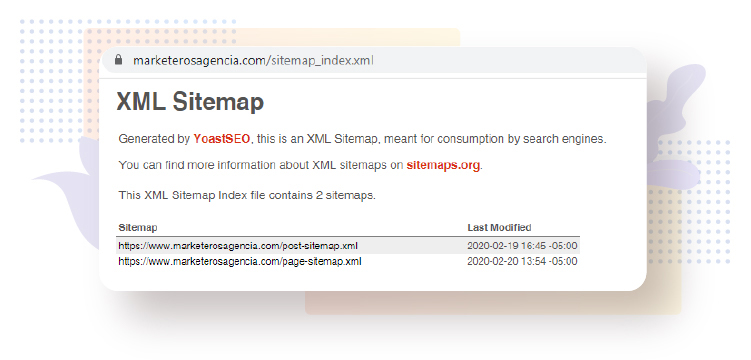
– The Hypertext Transfer Protocol Secure or HTTPS is not a factor that influences the indexing of a page, however, John Mueller himself, the principal trends analyst for webmasters at Google, has shared on his social media that it is a “light ranking factor” and that “having HTTPS is positive for users.” And of course, this is something that Marketeros Agencia agrees with:
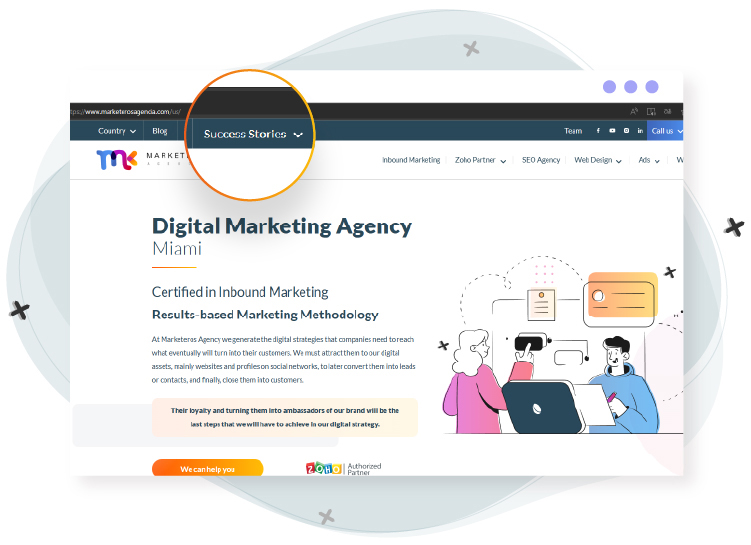
As a final detail, don’t forget to enable SSL security on your website to allow for proper transfer of encrypted data between the browser and your web server.
Website loading speed on different devices
The page speed on different devices has been a ranking factor since practically the beginning of the SEO world and is still one of the most influential factors today.
And Google always seeks to improve the experience of its users on the web, so any website with fast loading times will benefit in its ranking.
In addition, in mid-2018, Google released an update to its algorithm that still remains today, focused exclusively on the loading speed of websites on mobile devices. So, if your website does not load quickly on mobile devices, you could be penalized in your ranking.
To check these data, you can use Google’s Mobile-Friendly Test tool.

Compatibility with mobile devices
We will continue talking about compatibility with mobile devices because ease of use is another SEO factor that heavily influences our ranking.
Today, more people use mobile devices to access the web than desktop computers. That’s why Google has made changes in the way it ranks its search results.
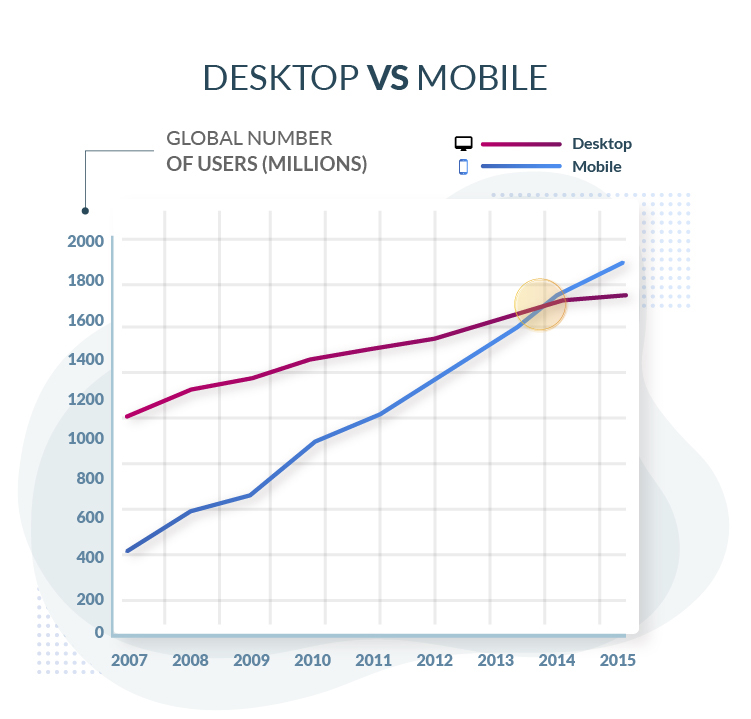
Mobile-first indexing is already a reality in Google, which means that for every search, results optimized for mobile devices will be given priority over those results whose websites are only oriented to desktop computers.
And that’s it, there’s no going back… if your website is not optimized for mobile devices, you can be sure that you will be at a disadvantage against other websites of similar topics that do have results optimized for mobile devices.
It is very important to take care of the user experience when entering your website. Therefore, in addition to all the ranking factors we will be seeing, it is also important to take into account the following aspects:
– Does your website automatically resize to fit the device performing the search?
– Do you use a suitable font to facilitate reading on small screens?
– Is it accessible and easy to navigate on all devices, including ease of managing menus?
– Are you sure your essential content is not hidden by incoming ads?
Domain age, URL, and Website Authority
Domain age
Did you know that almost 60% of websites that are ranked in the top positions of search engines have a domain age of over three years?
Our study through Ahrefs, in which we have collected data from more than two million pages, shows that very few websites under a year old manage to enter the top positions of search rankings.
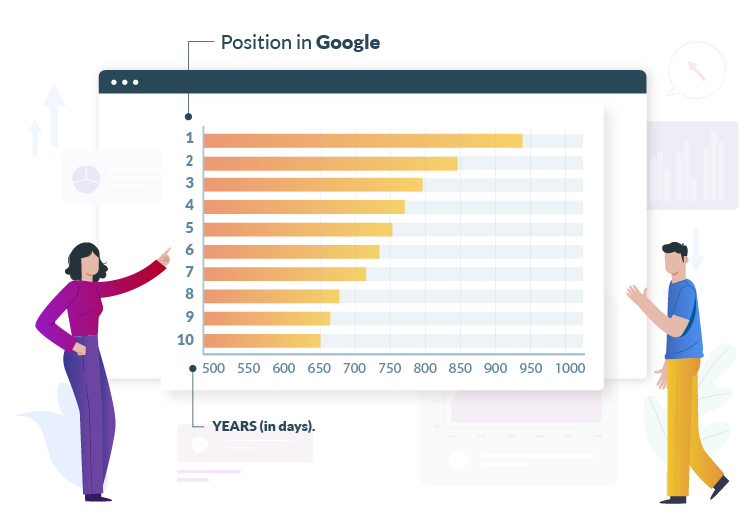
URL
Another important aspect to consider is the name we give our domain.
If you have looked over the SEO topic, you may have heard that Google penalizes exact match domains, which harms those where the target keyword is included in the URL. This is correct, but only partially… as it is a penalty that is only carried out against websites with reduced content and focused on SPAM.
However, domains that provide extensive and original information about a specific topic, with relevant and high-quality content, can benefit from including the target keyword in their URL.
Google always seeks to show the most useful results for the user, and that’s why it carries out this practice.
Authority
If we talk about ranking factors in search engines, one aspect to consider is the authority of our website.
It is an SEO concept that measures the popularity of a page, based on specific metrics that Google considers important in improving the web positioning of your page.
To keep it simple, it is a score that Google gives us based on several aspects, such as the quality of our content, our SEO presence outside of the page, incoming links, or resources shared on social networks.
For some years now, Google has not shared this value with the public, which made the task of SEO teams much more difficult. But over time, tools have emerged that can give us an approximate value of the impression that Google has of our website. One example of these tools is Moz, which codes all your data and then rates your website between values 0 and 100, with 0 being an unindexed website and 100 being the most popular website in the world, which is Google itself, of course.
nother option to verify the authority of both your domain and each page is to use Open Site Explorer. You only need to enter your URL in the search box on their main page and you will get a report that shows the domain authority, page authority, established links, and new links.
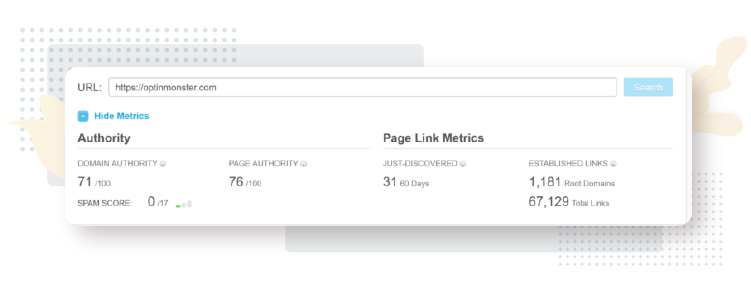
Optimized Content
If you’ve been following us until now, you’ll have realized that the content on your website is one of the most important ranking factors for Google, because without quality content, no matter what you do, you won’t be able to compete with other websites that do offer it.
In fact, along with user experience and links, it could be said that it is one of the fundamental pillars of Google when it comes to positioning a website.
Therefore, it is important that, in addition to having interesting and fluid content, we optimize it for SEO purposes.
As we explained in our recent article on search algorithms, these algorithms are based on keywords, which indicate to search engines what the theme of your website is. This is why keywords are so important in your content.
Another factor to consider is duplicate content. This is a common mistake among low-quality companies that consists of copying content from another website and passing it off as original content on their own website. This practice, if it ever worked correctly, was a long time ago… nowadays any self-respecting algorithm can distinguish between duplicate and original content, which leads to serious positioning penalties for those who copied the content from another website.
If for some reason you want to repeat content on your website, make sure to notify Google through the use of canonical URLs.
Search intent
Surely you have heard more than once that “Hey! It’s the intention that counts!” and this is something that Google strictly follows…
Over time and constant work in improving its algorithm, Google has been able to do something that was previously impossible due to lack of resources. Google no longer cares about what we search for, but about what we want to find.
For example, let’s say we search for the keyword “commercial premises in my city.” Google may think that you are a user looking for stores to go shopping, when in reality you are a business owner looking for a place to open your business, in which case the content that Google offers you would not meet your needs.
This no longer happens, or at least not as much as before. Now, the keywords that Google considers most important depend on the objective of the search:
– Navigation: for searches of a particular website.
– Informative: to obtain the answer to a question.
– Research: to acquire information prior to a purchase.
– Transactional: to make a purchase.
For proper optimization of our website, it is important to include content for each of these search objectives.
Content length
A recurring question in the world of SEO is whether the length of content influences search ranking.
Short answer… Yes.
Slightly longer answer… Google looks for quality content with a certain length, but it doesn’t like articles that stretch out without providing new information.
However, there is nothing that Google values more than lengthy content that, due to its subject matter or depth, requires it.
For example, for this same article on web positioning factors, whose complexity requires an extensive article that really has the ability to solve the user’s doubts.
In summary, if a piece of content requires depth, give it depth, but don’t stretch it out just to increase the number of characters because Google detects it and penalizes it accordingly.
That being said, as we can see in the following graph, content of over 2,000 words occupies the top positions in search engines:
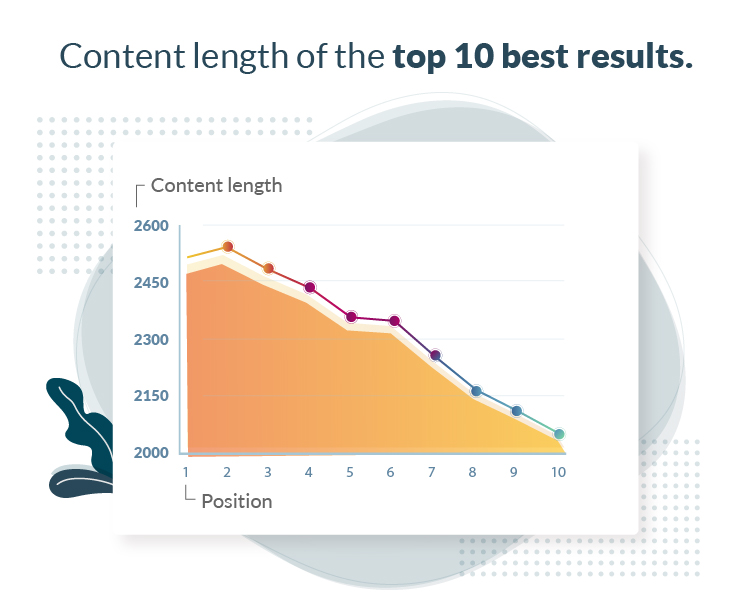
In addition, lengthy content favors the acquisition of shared resources, as well as the generation of links. Both factors are important when it comes to ranking a website.
Technical SEO
As we mentioned before, having a clean and debugged code through SEO audits is a significant optimization factor for content when it comes to search engine rankings.
Let’s look at some of the most important factors to consider:
– Include keywords in page titles, as this is where Google first looks to determine the topic of your content.
– Use header tags (H1, H2, H3) to qualify the hierarchy of your content.
– Write a 160-character meta description that can attract the reader while including keywords.
– When you have an image on your website that you consider relevant, do not forget to include an alt tag with the related keyword so that the search engine knows what it is looking at.
User experience (RankBrain)
It’s been over two years since Google introduced artificial intelligence (AI) into its search algorithm to better classify its results.
This artificial intelligence was baptized by its creators as RankBrain, and it is true to its name as it includes many new factors that affect positioning in its search engine.
Some of them are:
– Bounce rate: the percentage of single-page sessions, or in other words, sessions in which the user has left the page before interacting with it.
– CTR: also known as the click-through rate, it comes from the ratio between the number of clicks a website receives and the number of page impressions it has in search engines.
– Dwell time: it analyzes how long users stay on your website, from when they access the first page to when they definitively abandon it.
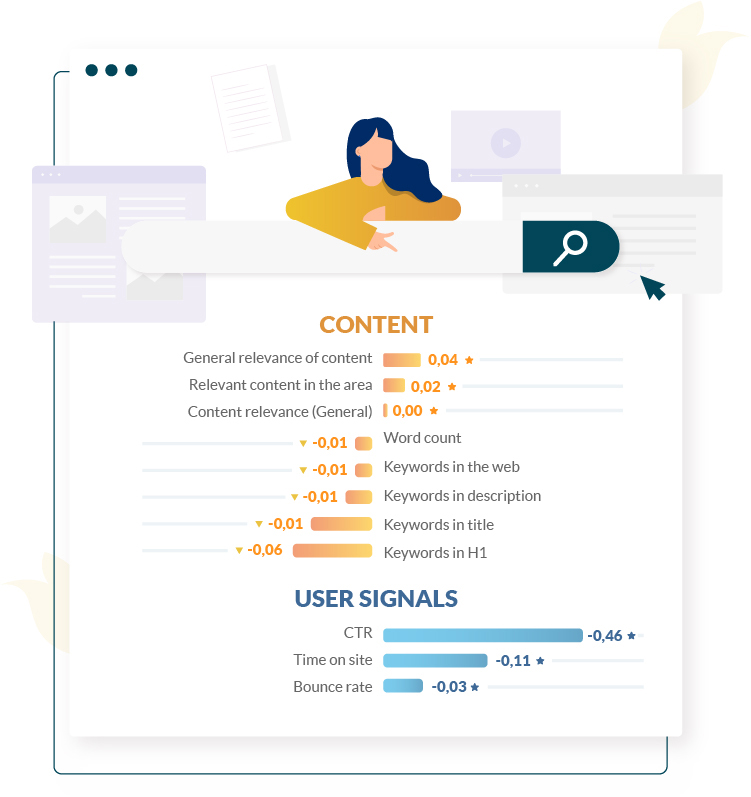
In summary, the optimization of titles, descriptions, and content should focus on getting users to stay as long as possible on our website, browsing and investigating every corner with a thirst for more content that interests them.
Links
As explained at the beginning of the article, every website with more than one page is based on links.
And, of course, Google gives them the importance they deserve, being one of the pillars of SEO ranking.
There are three types:
– Internal links: those that go from one page to another within the same domain.
– Incoming links: external links that point to your website from a different page than yours.
– Outgoing links: external link on your own website that points to a different website.
Incoming links are used by Google as a means of determining how much authority and relevance a piece of content possesses. It favors those links it deems relevant and harms those it considers forced.
Ideally, your website should include the fewest number of low-quality links, for which you can use tools like SEMRush, which can analyze and report all the links pointing to each of your pages.
Links are to SEO what blood is to the human body. If your links flow well, do not pile up and are of quality, your positioning strategy can work correctly. If, on the other hand, they all go together, come from anywhere, and do not know where they are pointing, your strategy will become sick and will not advance as it should.
Finally, do not forget that linking your content properly can help both Google and your visitors, increasing the user experience and making your page increase its authority.
Social Signals
As we have seen, content dissemination by external users on quality websites through external links is one of the main factors when defining the web positioning of a page.
Another very similar and equally important factor is when a user shares your content on their social networks. In fact, a recent cognitive study of SEO in more than 23 million actions tells us that there is indeed a link between social media actions and search engine rankings:
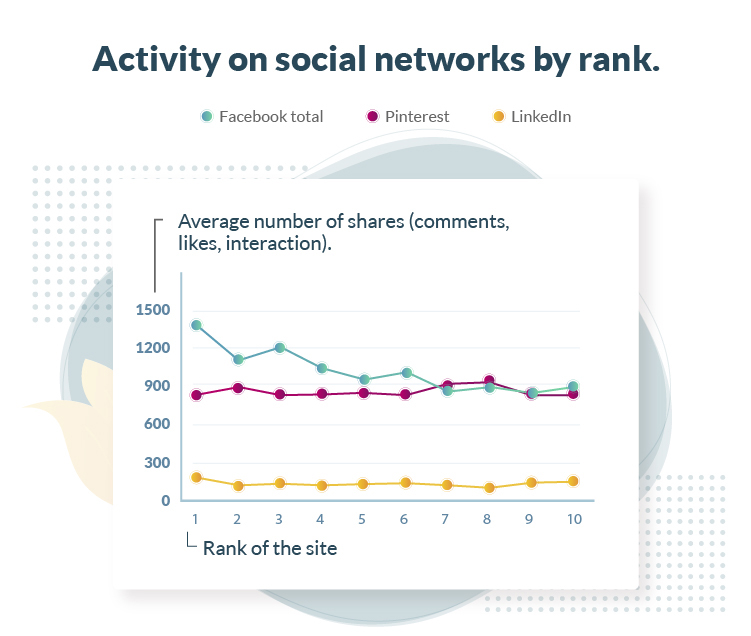
According to Google, this is not a direct positioning factor, insisting that social media links such as Facebook or Twitter do not count in the same way as authorized website external links.
What is undeniable is that those websites that currently rank high in their search rankings have a high presence on their social networks. The more you share your content, the more likely you are to find a user who is interested and links back to your site.
Therefore, even indirectly, social media content posts have an influence on our SEO.
Real commercial information
This is a point of maximum importance for companies that have physical commercial establishments. The presence or absence of commercial information is one of the most important SEO ranking factors on any website related to a physical location.
If you have a physical establishment, it is very important to create a Google My Business (GMB) listing with all the necessary information to give your business the visibility it needs.
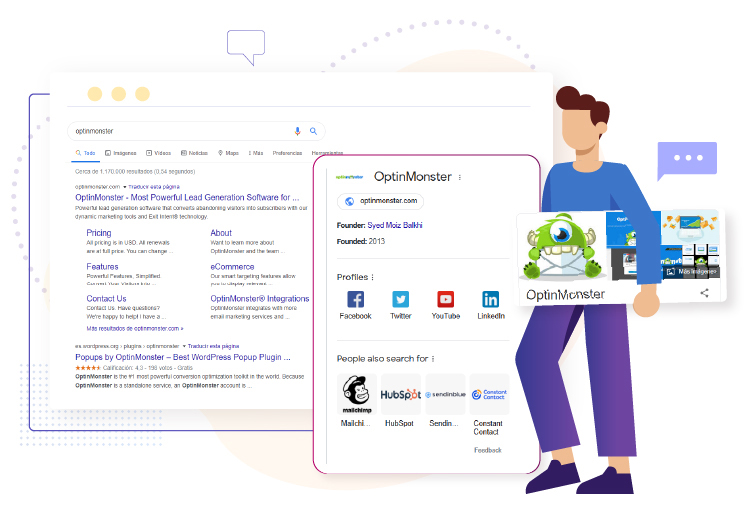
Also, keep in mind the following factors when including information about your physical commerce:
– Always include the name, address, and phone number of your location.
– Create business listings on platforms like GMB, Facebook, etc.
– Check if it is appropriate to add your business to business directories as long as they are of good quality and not intended for spamming.
– Use correct search terms, such as the city, neighborhood, or colloquial name where your location is located.
Conclusion and farewell
These have been the main factors in determining a website’s ranking.
There are many steps to follow and things to consider, and at Marketeros Agencia we know that it may seem like a daunting task for beginners.
Therefore, we encourage you to ask any questions on our website, and we would be happy to help you create a successful website.

